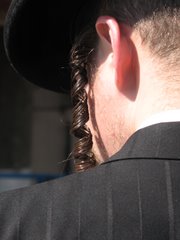The guest house I stayed in Rosh Pina, downhill from Tzfat, is owned by a couple who grew up together on a kibbutz and have been there ever since. Zmira and Meir, with weather worn faces, athletic builds and strong opinions, are just slightly older than the state of Israel herself. They might be the last of a generation whose lives were shaped by kibbutzim.
Meir met me at the entrance to the town and I followed him by car to their place, noticing that most of the streets were unmarked. The house had a view to the hills, orange trees in the yard and, alas, a large and loud family staying in the suite next to my room (which I had booked by phone without seeing a photo after striking out at several other guest houses).
Zmira and Meir's hospitality and personality made up for the room's lack of charm. In addition to giving me stacks of maps and brochures, they offered to take me on an orientation tour of Rosh Pina. It was already dark, but I wanted to leave early the next day for Tzfat, so I decided to go with them that night, hoping that in the morning I'd remember how to get around.
As I tried to lock the door to my room, Zmira intervened by removing the key and slamming the door shut. "Everything in Israel requires strength," she declared, insisting that the force made locking it easier (I subsequently discovered that the door locked just as well when gently closed).
I hopped into the backseat of their utility vehicle and off we went. They showed me the grocery store (we didn't stop) and the old city (we stopped and walked around) and a new shopping center (we didn't stop), and Meir let me know where to eat and, more importantly, where NOT to eat.
Meeting them reminded me that a few weeks before some us from the Ulpan went on a tour of Kibbutz Shefayim, one of the wealthier ones. Founded by Polish Jews, the kibbutz invested in collective funds in a hotel, conference center and other revenue producing real estate, allowing it to afford its more-or-less socialist principles. In recent years they've relaxed their rules, allowing members to keep all of the money received from inheritances, rental income, the sale of private property and cash gifts. Earned income, on the other hand, goes straight to the kibbutz and each member receives a stipend.
Our guide, one of the Ulpan teachers, is thrilled with kibbutz life and, it seemed, was trying to sell us on the concept. Having grown up with capitalism and having briefly worked in a socialist country, I didn't warm to the idea of having my income capped by the kibbutz formula, which imposes a ceiling on how much any member, even a high earner, can receive above the normal stipend.
But, I have to say, I was very taken by some of the perks of kibbutz life. Like their laundry system. Each member is assigned a number and given labels (printed with the number) to affix to their clothing, much as we might do before going to summer camp. The laundry building has a sorting wall, with chutes clearly marked by clothing type, e.g. "Dark pants", "White underwear". Members deposit their soiled items in the appropriate chutes and can pick up the clean and folded clothes the next day. The kibbutz also has resident repair folks, so help with plumbing, electrical or Internet problems is just a phone call away and you don't necessarily have to be home when they come. And they have a car sharing system - sort of like Zipcar but with greater flexibility.
Although kibbutz life is waning in Israel, this particular place has a waiting list. And while I wouldn't want to live there, I think I can understand why.
Sunday, March 25, 2007
Subscribe to:
Post Comments (Atom)

No comments:
Post a Comment